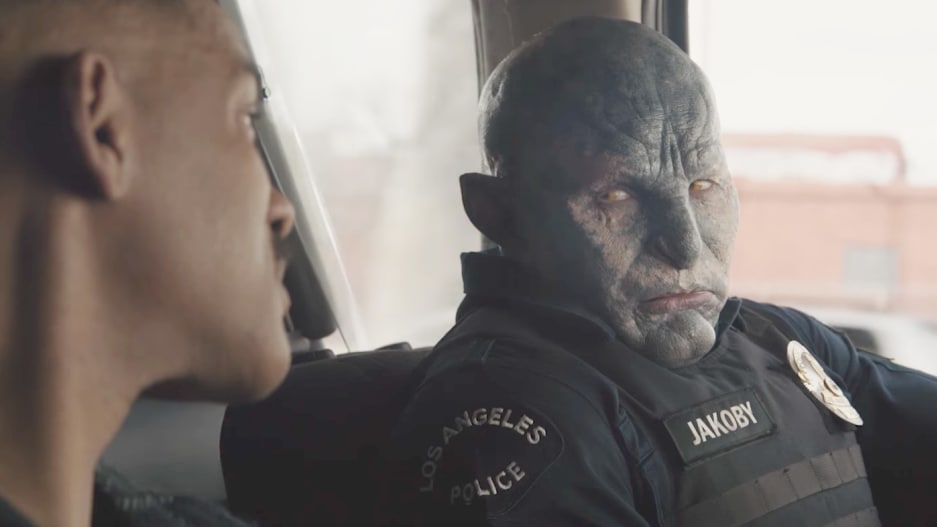Review: Bright (2017)

The introductory sequence of Bright is enchanting: signs and street art in Los Angeles that describe a world where the races of historical high fantasy stuck around into the present day to become the mocked or honored subjects of political graffiti.
But once characters start talking, this geeky cool evaporates into a mediocre buddy-cop movie. The swirling fantasy tropes are a trash gyre on the seas of racial allegory.
Bright's contemporary LA is also anchored in the past, all sterotypical gang violence, decrepit public services and despotic crime lords. At the top of society are elves, whose fortified enclaves echo South African apartheid more than Jim Crow. At the bottom are orcs, an underclass repressed due to their former allegiance to a long-defeated Dark Lord.
In the middle is humankind, whose own internal racial consciousness and strata are supposedly absent or muted in the world of Bright-but whose humans constantly exhibit our world's racial conscioussness and strata.
When star Will Smith's character kills a verminous bat-like fairy, for example, he declares that "Fairy lives don't matter today." The "today" warps a quip into darker territory: it suggests that fairies are sentient enough for there to be a slogan opposing the moral insignificance of their lives and that he is sick of hearing about it. Smith apparently ad-libbed the line, and offers a similar one later, telling an Orc to get his "Shrek ass" out of the way.
Imagine the cultural signifiance of Shrek in the world of Bright! No-one involved in making Bright did.
That said, it's surely a mercy that this fantasy world's history is only lightly exposed, a good policy at the best of times. The incipient fandom's first demand is for more dry, encyclopedic lore.
What can be said about the story, though? It suffers throughout from being a toybox of generic fantasy elements tossed into a cop flick, which means there's never any solid sense of what can't happen. Joel Edgerton, as the affable and tolerant rookie Orc cop Jakoby, is the best thing about it. When Will Smith isn't phoning it in as unwilling partner Ward, the two have a few good moments ("You're not in a prophecy, you're in a stolen Toyota.") Noomi Rapace is perfectly-cast as a viciously athletic elf villain, but her character has all the depth of a Magic: The Gathering card. idgar Ramirez and Happy Anderson are given more to work with as FBI pardners, a dandy elf and shlubby human, hot on the heels of Noomi's apocalyptic cult. Bright refers to people (few elves and rare humans) who have the magical potential to command the movie's mcguffin, Noomi's stolen wand. You get the picture.

Bright's storytelling problem is that it knows all the tropes but not what tropes are for. Its racial consciousness is a cartoon sketch of Alien Nation, Shadowrun and Colors, dating it with peculiar accuracy to 1988. It's so incoherent that it could hardly be offensive, but it does echo two tragic lies: that racism's personal dimensions can be overcome through enlightenent, and that racism's structural invincibility grows from biological distinction.
Netflix's $90m stab at a straight-to-internet blockbuster, Bright was mauled by critics. But it's liked by a motley set: I've seen vigorous defenses from suburban Hot Topic kids, meme-slinging Trumpkins, Sorkin Democrats, even a young activist who pointed out that it is at least better than Crash. What unites all these people? Maybe they just want fantasy stuff mashed into everything. Perhaps they feel that no part of American society should be held responsible for its collective failures. We've always preferred to imagine ourselves framed by a natural order beyond our consent, after all. But only Bright's has ninja elves.
a...a...aaa